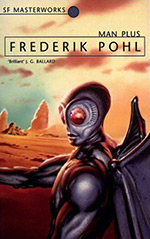
![]() Sable Aradia
Sable Aradia
1/21/2018
![]()
Read for the 12 Awards in 12 Months Challenge and the SF Masterworks Reading Challenge and Science Fiction Masterworks Reading Club here on Goodreads.
This novel won the 1976 Nebula Award.
Some books stand up to the vicissitudes of time better than others. I'm a big believer in taking vintage SF on its face, and reading it as alternate history in some cases as opposed to a vision of the future, but in this particular case, that was really challenging for me, and I don't recommend it to anyone younger than I am because I don't think they would get it.
I'm old enough to remember the Cold War. I'm old enough to remember growing up in the 80s (I was 10 in 1985; you do the math) and I remember how it felt to be convinced that any day, any day now, we were going to incinerate ourselves in a nuclear holocaust. You have to accept this mindset to accept this novel, because otherwise it makes no sense.
I also found it challenging to accept, since we're on the verge of finally making a manned mission to Mars, accepting all the anachronisms around getting there in this novel. It was written in the 1970s when computers were clunky. I can't imagine doing what they're doing with the stuff they were trying to do it with. And yet...
And yet, what Pohl was trying to do with this novel was astoundingly ambitious, and might even be prescient, if you don't linger overmuch on technology that is capable of almost completely replacing the human body with cybernetics, but is incapable of running all those systems without a computer terminal the size of a backpack that must communicate with a mainframe.
Roger Torroway is an astronaut who has been assigned to the Man Plus project. The object? To make a man capable of living on Mars, unaided by a biodome. The novel concerns itself with the dehumanizing effects of the technology, and speculates that a human who has almost entirely been replaced by machines may not be exactly human anymore.
I don't agree, and I don't think most modern readers would, but that was a valid concern in the 70s and even 80s and writers spent a lot of time on it. It was believed that machine parts might be better than human parts (see The Six Million Dollar Man and the Bionic Woman,) but of course, now it's become apparent that the human system is so complex that this is doubtful at best.
But assuming it's so, much of the novel also centers around relationships. Here the novel becomes even harder for the modern reader to read. The sexism is extremely distracting. Torroway's very liberated wife has a pottery shop all her own; how cute! And the doctors and astronauts are all men, except the psychologist of course. And the men call her "sweetheart." Also they're smoking everywhere, including in a hospital environment in rooms with the patient. I'm telling you, if 1970s SF is any indication, women's liberation happened in the 70s because it was a necessity. There's some casual racism as well. Not as much, but a little.
By this time, Pohl had been writing sci-fi for many years, and was in his 70s, so I guess he was trying. But he clearly held certain views of toxic masculinity and it's hard to read now. For instance, a character who was a chronic womanizer would cheat with someone's wife because he had managed to avoid all athletic competitions in his youth and was therefore inclined to be a moral coward.
Okay; now that I've given you all its flaws, let me talk about its merits, and why it does indeed deserve to be in the SF Masterworks. I don't think anyone had ever examined the issue of technological dehumanization quite as thoroughly before this book. And what he has to say about letting computers do all our thinking diminishing our ability to make our own decisions and trust our own senses is poignant in this age of social media spreading mass hysteria, and science becoming so complex that many people, incapable of understanding it, rejecting its validity entirely.
I'm convinced that James Cameron and/or Bill Wisher, who wrote the script for The Terminator, must have read this book, because in many ways it's an anti-Terminator plot (nope, not telling you more, that would be a spoiler!)
Also, I've read it before. I remember that its ideas spawned a short story I wrote for an assignment on adaptation when I was about eleven (I took it to an underwater environment). Also as I recall, I got an A.
Also, the ending is a neat surprise that puts the whole thing in an entirely different context than when you started reading it.
Do I recommend it? Well, sure, if you're like me and you can mostly ignore the anachronisms; and if you can accept that during the Cold War, the extermination of the species through nuclear war seemed a far greater threat than climate change. Certainly it's a formative book, and those who enjoy vintage sci-fi will enjoy it. But younger and modern readers might find all that too much work, and perhaps should give it a pass.
http://dianemorrison.wordpress.com